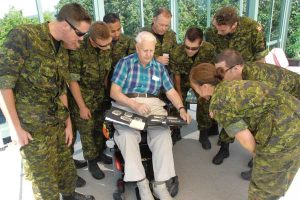Nijmegen team gets a history lesson
By Lookout on Jul 15, 2013 with Comments 0

Maurice Hundleby, 91, shows the 2013 CFB Esquimalt Nijmegen Marching Team photos from his time in the Netherlands as part of Canada Command Headquarters during the Second World War.
Two weeks ago, shouldering 30 pound rucksacks in 30 degree heat, the 11-member CFB Esquimalt Nijmegen March team trekked from the field at Work Point to the Lodge at Broadmead in full kit.
Waiting for them at the end of their journey was Maurice Hundleby, a 91-year-old veteran.
The team, on one of their final training marches before heading to The Netherlands for the rigorous annual four day march, was making a special visit to see Hundleby.
Hundleby, who was born in Victoria in 1922, joined the infantry before heading to Europe in 1944 to work as a clerk in the Canadian Command Headquarters in Nijmegen as Allied forces liberated the Netherlands from Nazi occupation.
Germany invaded the Netherlands in May 1940 and relinquished its stronghold in 1945, when it was liberated by Canadian Forces. The region was in rough shape as famine, forced upon the Dutch citizens by the Nazi government, had led to the deaths of about 20,000 people.
“I remember walking through the streets and seeing the kids there starving. Everyone was living on bread. We gave them whatever we could,” he recalls sitting on the rooftop terrace at Broadmead Care, a Victoria retirement home for veterans, surrounded by young military members in CADPAT.
On Tuesday, July 16, the base marching team, dressed in combat uniform and carrying a 10kg rucksack, will begin their walk through the same territories Hundleby and other Canadian Forces member traversed 68 years ago.
“I wanted the team to get a first-hand account of what that time was like, and why we’re doing what we do,” says CPO2 Chris Koblun, team leader for the Nijmegen March. “The march is about honouring the relationship Canada has with the Netherlands, a relationship that Mr. Hundleby had a direct hand in establishing.”
Hundleby says Canadians are still loved by the Dutch, who continue to honor the sacrifices Canadian soldiers made to liberate their country.
“In Holland it’s almost as if the Canadians are celebrities,” he says. “I know they’ll have a great time over there. Canadians are always treated very well.”
To help give the team a clearer picture of Holland 68 years ago, Hundleby brought out a cherished album. The well-preserved black and white photos show buildings in ruins, the rebuilding operations, children looking for sweets, the beautiful Dutch countryside, and rows of crosses.
“When I realized that I would never be in the thick of it, it turned into a picture taking trip for me,” says Hundleby. “I was very affected by what I saw over there. I wanted to remember it and make sure that people later on saw it too.”
CPO2 Koblun says visiting Hundleby was a way to remind them that the actions of others can have long-lasting consequences.
“It really drives home the struggle these people went through, and the bond our two countries formed in that struggle,” says CPO2 Koblun. “We can never forget that as members of the Canadian Armed Forces our actions have weight, and could very well change the world some day. This is our way of remembering.”
The Canadian Armed Forces have participated in the march since 1950. Fifteen teams from across the country are currently in Nijmegen, with the Esquimalt group representing the West Coast. They are marching 40 kilometres a day for four days, starting at 4:30 a.m. and finishing about 1 p.m.
-Shawn O’Hara, Staff Writer
Filed Under: Top Stories
About the Author:





